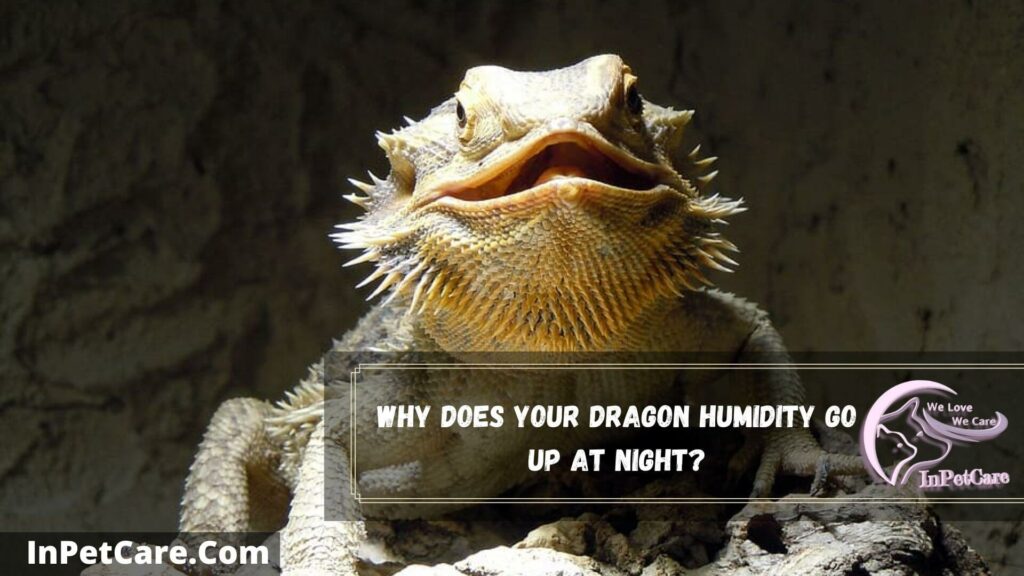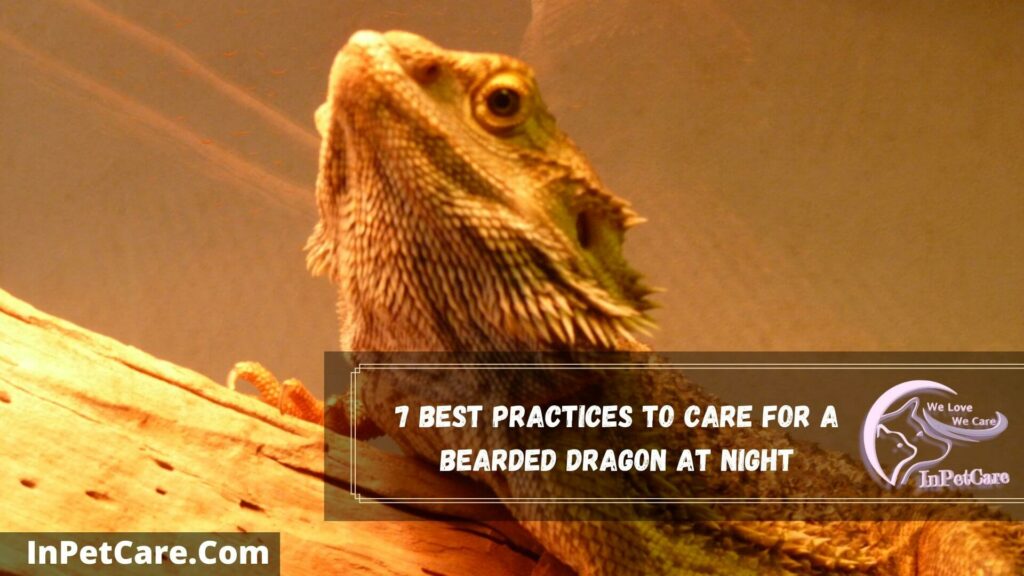The bearded dragon is one of the most popular reptiles kept by many people in the United States. You will find many reptiles enthusiasts devoted to the dragon. They are popular for being social, docile, and calm pets. As humans, those bearded dragons are also diurnal, meaning; they are active during the day and sleeping throughout the night.
Usually, bearded Dragon humidity goes up at night, which seems to be worrying for most owners. It is vital to know the proper care for a bearded dragon at night. In high humidity, a bearded dragon can have respiratory issues in its system. Let’s learn why Bearded Dragon humidity goes up at night and what you can do about it.
Why bearded Dragon humidity goes up at night? Because of the temperature drop, the relative humidity rises at night inside a bearded dragon enclosure. The ideal humidity for constant growth is between 20% to 40% day or night for bearded dragons. One should maintain a temperature between 70 degrees to 75 degrees Fahrenheit at night at least.
Keeping the temperature above 77 degrees, Fahrenheit is crucial to support constant growth, livelihood, and well-being during the daytime. Temperature below 77 degrees Fahrenheit will result in lung inflammation. High humidity will cause damage to the respiratory system. Too low humidity is also a problem and can lead to a severe health issue, same as too high humidity.
Before we learn why bearded Dragon humidity goes up at night in-depth & its solution, let’s understand why beard dragons need humidity? Proper humidity helps to control their health, constant growth, and livelihood. The right temperature and humidity are some of the best care for a bearded dragon for good well-being.
Post Contents
What Happens If The Humidity Is Too High?
Keeping bearded dragons in too high humidity for a more extended period will cause damage to their respiratory system. A bearded dragon kept in high humidity is likely to suffer from respiratory infections and similar diseases. Apart from that, bacterial growth is expected to happen as well. Moisture combined with warmth creates a perfect environment for bacteria to grow, thrive, and survive.
Plus, Bearded Dragons are not used to high humidity. Being sensible to high humidity, you should keep the bearded dragon far from it. High humidity can lead your bearded dragon to a severe disease quickly. By high humidity, I mean humidity of over 60%. Humidity over 60% is going to make a dragon sick. Try to keep your bearded dragon in a maintained environment with humidity of around 20% to 30%.
Why Does Your Dragon Humidity Go Up At Night?

Here are the following reasons why a bearded dragon humidity goes up at night
- Frequent Misting. If you have frequently been misting your bearded dragon and its enclosure, it is common to notice an increment in humidity level. Avoid often misting in your bearded dragon or its captivity.
- Live plants. Live plants are great at holding moisture. If you have kept a live plant inside an enclosure of your bearded dragon or in the room where the home of a bearded dragon is situated, then it could also lead to high humidity. Live plants usually create a microclimate in the Dragon enclosure. High moisture is likely to occur near the microclimate of the plant.
- Big water bowl on the hotter side. If you have kept a big water bowl on the hotter side of the terrarium, high humidity is likely to occur.
- Moist-Holding Substrate. If you have used bark or coconut substrate to decor the enclosure of your bearded dragon, then remove it. It is one of those materials that hold moisture rapidly. I personally don’t like using most substrates. If the substrate has water or is too wet, then it can raise the humidity higher too.
- Low basking bulb temperature. Low temperature can also raise relative humidity inside your dragon enclosure. You can consider checking the basking bulb temperature. If the basking bulb temperature is low, it could be why bearded Dragon humidity goes up at night.
5 Ways To Lower Humidity Level When Bearded Dragon Humidity Goes Up At Night
Here, I will discuss the five most straightforward and effective ways to lower the level of humidity when it goes up at night inside the Bearded Dragon enclosure.
Dehumidifier
You can find tons of options in the humidifier for your bearded dragon enclosure. You can install one and easily pull out the moisture. Alternatively, you can put a fan in such a position that it can effectively pull out all the humidity while lowering it.
Increase Basking Bulb Temperature
It would be best if you considered increasing the temperature of your basking bulb installed for the bearded dragon and its enclosure. Usually, an increase in temperature results in a humidity dropping.
Switch Substrate Or Completely Remove Them
There are many specific types of substrate that hold moisture for too long. For example, bark and coconut substrate are the typical culprits of raising humidity higher. You should consider switching or obliterating that kind of substrate.
Ventilation
It would be best to increase the ventilation to control the humidity level inside your room or in the tank. It will allow more air to circulate while leaving the humidity in the room where the habitat is kept. Get proper ventilation from any hardware store and install one. There are different types of ventilation available in different varieties and sizes.
Adjust Fan Or AC Speed
If there is a running fan or AC in the room where your bearded dragon’s enclosure has been kept, it can interfere with the enclosure temperature and humidity. It would help if you considered lowering the fan or the AC speed to control the humidity level. Alternatively, you may also need to increase the ac or fan speed if reducing doesn’t work.
7 Best Practices To Care For A Bearded Dragon At Night

Here, we will learn about the best practices to care for a bearded dragon at night which will help you give them a good life. If you want to provide a completely comfortable environment to your bearded dragon, then consider practicing this care routine.
If you want to avoid any interference in their sleeping time, consider turning off the white light. You should avoid keeping the white light on because, just like humans, they also need plenty of shut-eye to feel their best. I find myself turning my white light off when its enclosure is in my room.
However, it is essential to ensure that the ultraviolet light can reach and is on, of course. You just need to ensure that the light from the basking bulb or lamp emits purple instead of white. Many heat lamps produce white lights, which are unsuitable for your bearded dragon sleep or its pattern. I recommend you use or replace the usual daytime bulb with an incandescent heat bulb.
Increase The Temperature Of Your Basking Bulb
It would help if you increased the temperature of the basking bulb near the enclosure at night. Particularly. It is usual for the temperature to drop at night compared to the day. Believe it or not, even a 10 degree Fahrenheit change in temperature can make a huge difference in their growth and health. It is crucial to maintain a perfect temperature of around 70 degrees to 75 degrees Fahrenheit at night.
It will also help the humidity to be maintained between 30% to 40%. If there is no external interference or wrong with the installation of devices, it is alone enough to maintain 30 to 40% humidity.
Provide Additional Nighttime
If you don’t know, then let me tell you, Bearded Dragons are from the deserts of Australia. It alone means that they need additional heat sources. You should never make a mistake by turning off the daylight heat at night or in the middle of the night when it is too cold. It is recommended to have good quality under-tank heat mats or ceramic heat mats for the bearded Dragon comfort. Without additional nighttime heat, your bearded dragon can get cold in the middle of the night.
Always make sure that your under-tank heat mats don’t cause any thermal burns to your scaly reptile. You should avoid keeping it for too long. I usually leave the under-tank heat mats until I go to bed and then leave only before sleep. Then, ceramic emitters are turned on to do the works.
Install 2 Hygrometers For An Accurate Humidity Reading
I recommend you install two hygrometers for accurate humidity reading. You should also install it in the center because, in most cases, one end of the enclosure tends to be hotter than the other is cool. Installing two will give you confidence in reading and maintaining the right level of humidity. It might not sound like a pro tip, but it is one of the most used practices by Pro reptile keepers.
Remove All Uneaten Food
It would be best if you kept their enclosure clean at night time. Removing all uneaten food should be a daily routine for you every night. It also helps you make sure that you are giving them a proper amount of food daily. When cleaning the food, if you found the majority of the uneaten food left from the day, consider switching the food variety. Sometimes, a bearded dragon can also get bored by eating the same thing all day. Feeding Dubia roaches to beardie will help.
On the other side, you should add more food if there is no food left at the end of the day. Maybe trying or adding a little bit more will help your bearded dragon kill their hunger. I usually keep a large bowl consistently full of foods throughout the day and then empty it at night.
Gut Load Their Feed
Believe it or not but just feeding insects to your bearded dragon will not provide all the nutrients on its own. One of the most faced issues with the feeder insects like mealworms or cricket is that it does not always contain all the nutrients necessary for your bearded dragon to fulfill all its nutritional needs and maintain its body function. You should also feed gut-loaded Dubia roaches too.
Most bearded Dragons need leafy greens and vegetables to fulfill their nutritional needs. One of the best ways to help give all the nutrients to your bearded dragon is just loading their feeder insects. It would be best to feed feeder insects like crickets and mealworms when their gut is fully loaded. Gut loading will also help you in increasing the nutrient intake of a bearded dragon.
If you don’t know, then let me tell you, mealworms and crickets can be gut-loaded. You can find many gut-packed products available in the commercial Store or online to feed your cricket and mealworms before feeding them to your dragon. You can do this any time of the day. You can let the insects gorge themselves all night to gut load before becoming the food of your bearded dragon the next day. Anywhere between 12 to 14 hours will be enough for the feeder insects to ingest enough nutrients.
Remove moisture-holding Decors And Substrate.
If you want to avoid raising humidity levels, consider removing all kinds of decors and substrates that hold moisture.
Conclusion
Bearded Dragons are primarily active in the daytime. However, if bearded dragon humidity goes up at night, then it can cause discomfort to them. It is a threat to the respiratory system. So, when you notice such a situation, your responsibility increases like a sunrise. Be sure to maintain the right temperature and humidity inside the tank.
It is best to install two hygrometers for a proper and accurate reading. If you are not confident with the task being precise, you will not be able to maintain the humidity between 30% to 40%. Always make sure to have a great bedtime routine for your bearded dragon. I hope that I managed to give you all the information needed to know why does bearded Dragon humidity go up at night. If you find this post helpful, then please share this post further. If you have any questions, then comment below & ask. Follow us on social media

94% of pet owners say their animal pal makes them smile more than once a day. In 2007, I realized that I was made for saving Animals. My father is a Vet, and I think every pet deserves one. I started this blog, “InPetCare”, in 2019 with my father to enlighten a wider audience.
